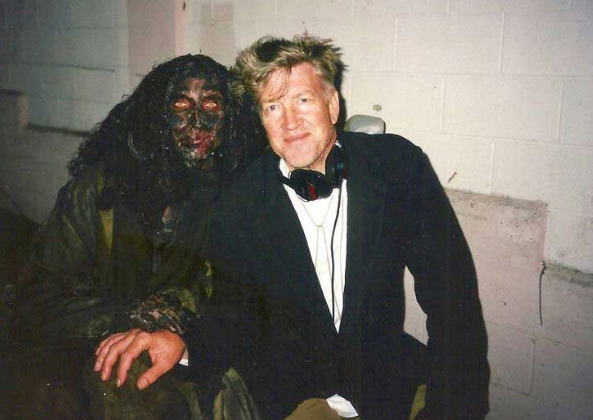by Jason Adams

Sometimes all it takes is one look. Ang Lee be damned film captures twenty-four individual moments every second -- twenty-four chances every single second to burn an image into infamy. And I don't know if there's a director alive who understands that power greater than David Lynch, who's sneaked into the world more individual frames of fright, of luminous beauty, and of the overlap therein, than most will ever come leagues near. And today for his 74th birthday we're turning our eyes towards one of them -- one image, one moment, and one of the greatest single second scares ever put on screen.
We speak of course of Winkies. More specifically the dumpster behind Winkies...
a diner where two guys in suits sit chatting in bright cheerful late morning sunlight. One of the guys (Patrick Fichsler, gloriously sweaty) tells the story of a dream he's had of this exact place, of Winkies, and of a man he's seen behind the diner in the dream. He says he's come to this place to be rid of its haunting of him, and so the two men go out back to put the bad dream to rest. It, uhh, doesn't work out that way.
This scene, which feels dropped in from another universe only fifteen minutes into the start of Mulholland Drive -- which up to this point has been grounded in reality -- obviously echoes the larger story of the film, with its two characters investigating a horror they don't really understand only to have their absolute worst fears confirmed. Is there anything we dread more than the worst coming true? Even worse than the worst -- a worst you can't even comprehend, can't even wrap your brain around.
I've watched this scene a hundred times and it remains impossible to sort out exactly what makes it so deeply traumatizing in only words -- the pieces are there, with Badalamenti's unsettling score and Fischler's panicked countenance and the quite literal "jump scare" factor, as the "Bum" character (Bonnie Aarons) pops out from behind the dumpster at the exact moment she should, an ink-blot exploding across a blank page. We've seen these things used to far lesser effect in the world -- how does Lynch make this moment so terrifying that I quake now just typing about it?
 In a 2014 interview at Vulture with Aarons -- who's gone on the play the face of The Nun in The Conjuring universe with similar creepiness -- I think an absolutely vital piece of the puzzle was uncovered, and one that links it to what makes the work of David Lynch eternal and one of a kind. Aarons says she was attracted to Lynch, and as they worked out the expression she'd make as she popped out from behind the dumpster he had her use the dreamy-eyed one he'd caught her staring at him with, which the interviewer calls "sex eyes." Aarons replies, with a quote for the ages:
In a 2014 interview at Vulture with Aarons -- who's gone on the play the face of The Nun in The Conjuring universe with similar creepiness -- I think an absolutely vital piece of the puzzle was uncovered, and one that links it to what makes the work of David Lynch eternal and one of a kind. Aarons says she was attracted to Lynch, and as they worked out the expression she'd make as she popped out from behind the dumpster he had her use the dreamy-eyed one he'd caught her staring at him with, which the interviewer calls "sex eyes." Aarons replies, with a quote for the ages:
"Love can kill, can’t it, baby?"